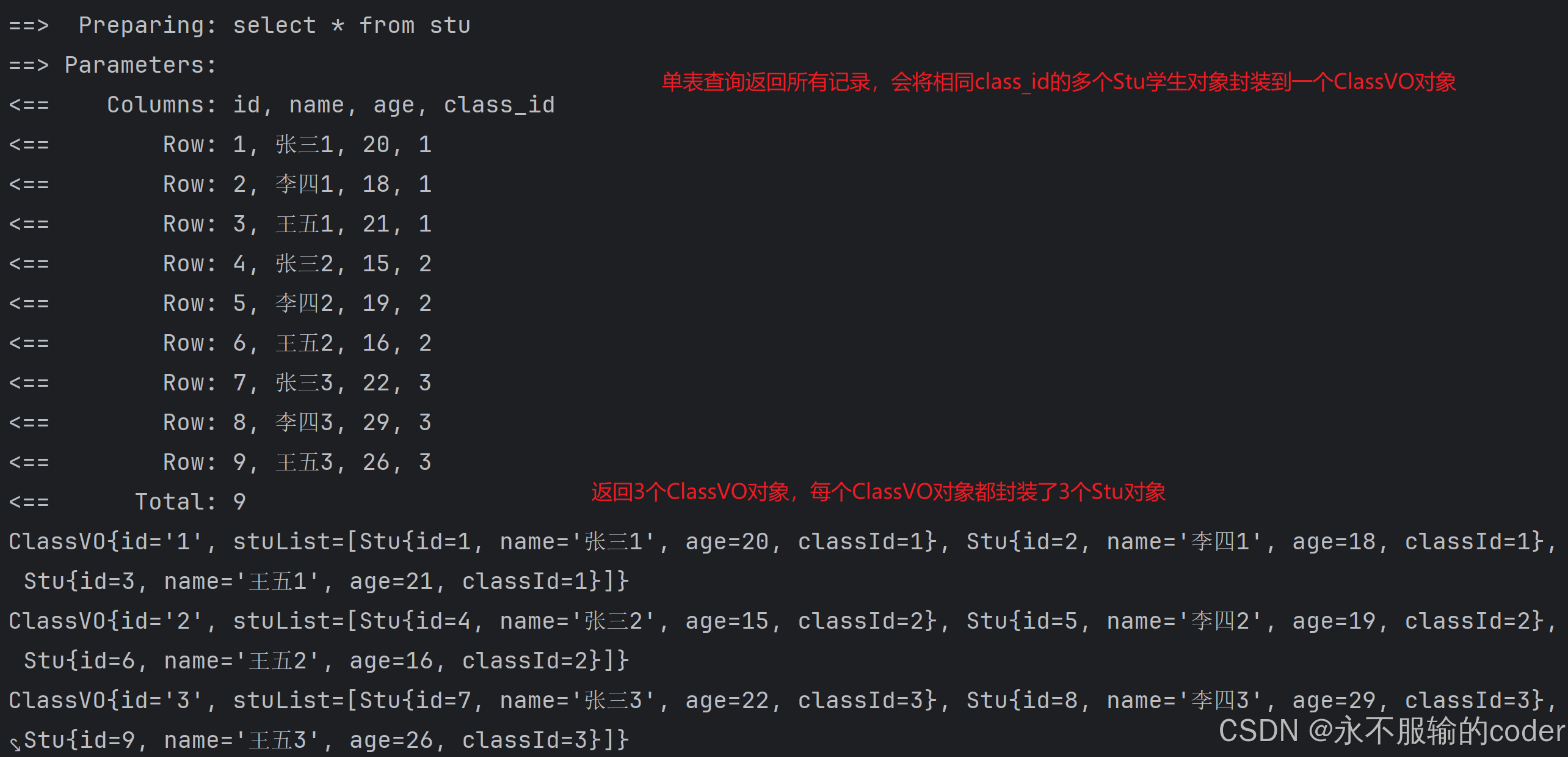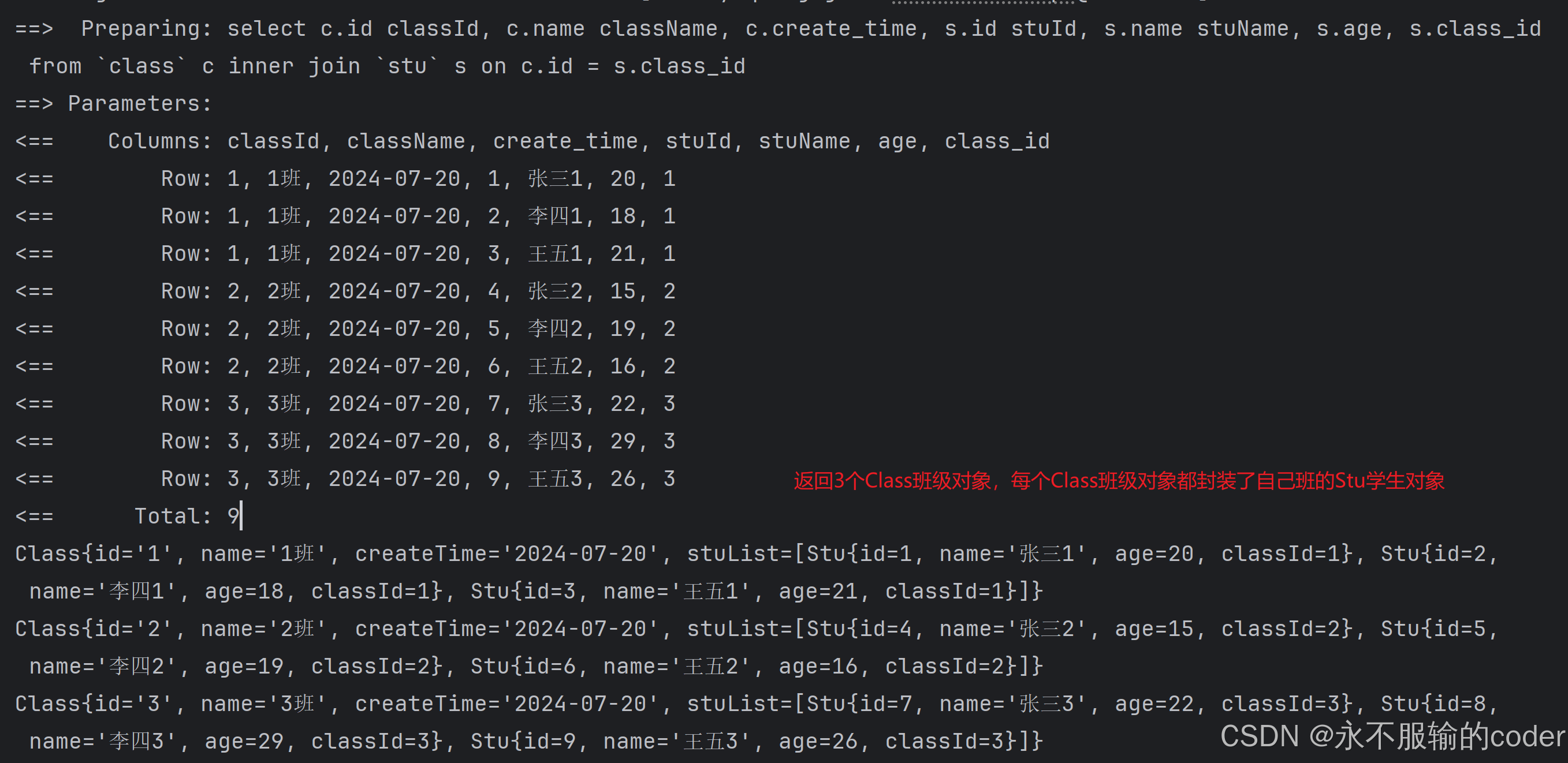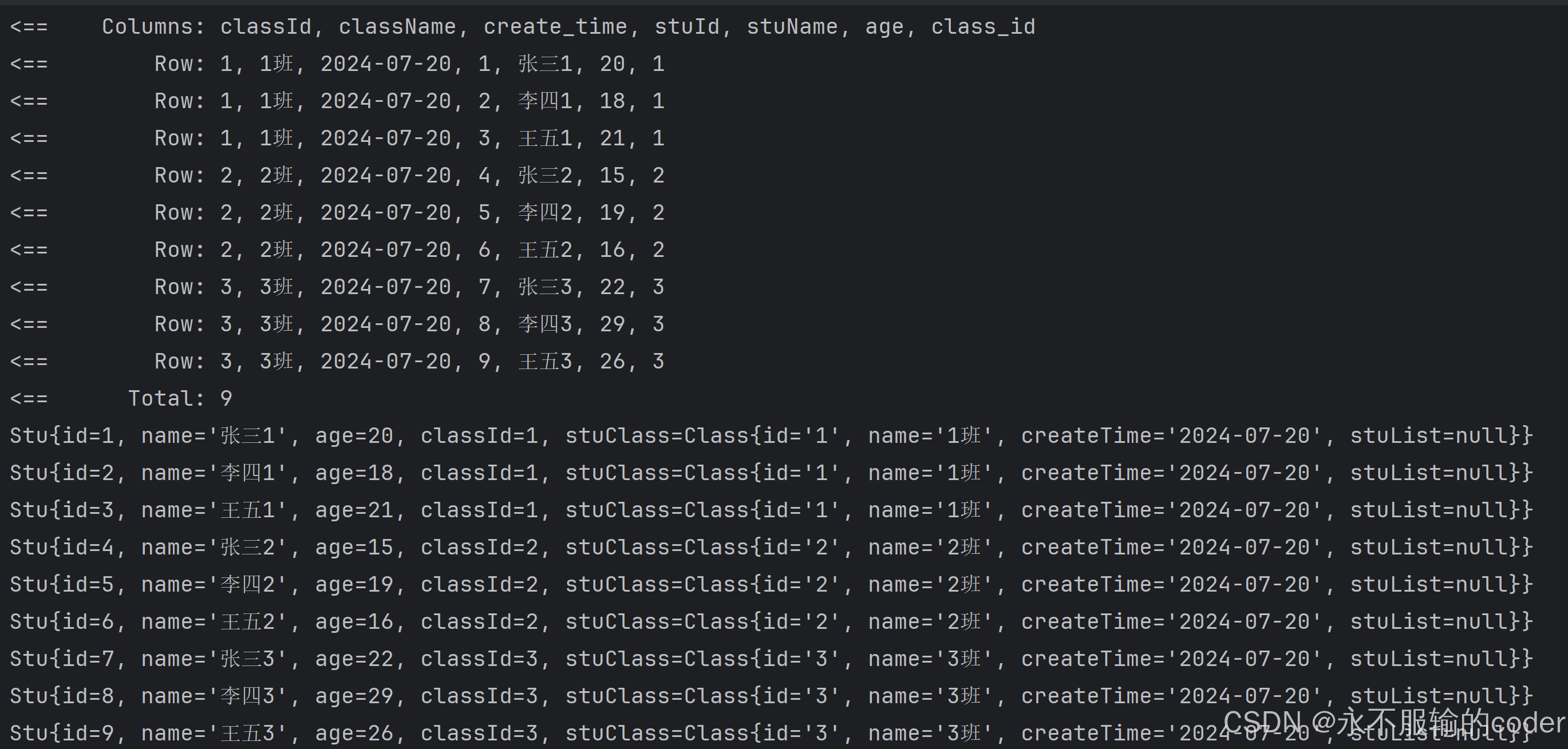1、目标
本文的主要目标是MyBatis使用collection标签完成一对多的嵌套查询,使用association标签完成一对一的嵌套查询
2、一对多的嵌套查询用collection标签
2.1 多表查询并且resultMap是数据库的class表
create table `class` (
`id` int primary key auto_increment,
`name` varchar(100) not null,
`create_time` date not null
);
create table `stu` (
`id` int primary key auto_increment,
`name` varchar(100) not null,
`age` int not null,
`class_id` int not null
);
先在数据库创建表class和stu,class是班级表,stu是学生表,stu学生表中包含class_id字段表示这个学生在哪个班级中
insert into `class`(`name`, `create_time`) values ('1班', now()), ('2班', now()), ('3班', now());
然后在class表中插入记录
insert into `stu`(`name`, `age`, `class_id`) values ('张三1', 20, 1), ('李四1', 18, 1), ('王五1', 21, 1),
('张三2', 15, 2), ('李四2', 19, 2), ('王五2', 16, 2),
('张三3', 22, 3), ('李四3', 29, 3), ('王五3', 26, 3);
然后在stu表中插入记录
@Data
public class Class {
private String id;
private String name;
private String createTime;
private List<Stu> stuList;
@Override
public String toString() {
return "Class{" +
"id='" + id + '\'' +
", name='" + name + '\'' +
", createTime='" + createTime + '\'' +
", stuList=" + stuList +
'}';
}
}
创建Class实体类,对应class表的字段,其中多了一个字段是stuList这个list集合,因为一个班级包含了多个学生,这里是一对多的嵌套查询因此用collection标签
@Data
public class Stu {
private Integer id;
private String name;
private Integer age;
private Integer classId;
@Override
public String toString() {
return "Stu{" +
"id=" + id +
", name='" + name + '\'' +
", age=" + age +
", classId=" + classId +
'}';
}
}
创建Stu实体类,对应stu表的字段
@Mapper
public interface ClassMapper {
Class getClass(@Param("className") String className);
}
创建ClassMapper的接口方法getClass,入参是className,出参是一个Class班级对象,这个班级对象会封装多个学生对象
<?xml version="1.0" encoding="UTF-8"?>
<!DOCTYPE mapper PUBLIC "-//mybatis.org//DTD Mapper 3.0//EN" "http://mybatis.org/dtd/mybatis-3-mapper.dtd">
<mapper namespace="org.apache.mybatisDemo.ClassMapper">
<resultMap id="classMap" type="org.apache.mybatisDemo.Class">
<id property="id" column="classId"/>
<result property="name" column="className"/>
<result property="createTime" column="create_time"/>
<collection property="stuList" javaType="java.util.List" ofType="org.apache.mybatisDemo.Stu">
<result property="id" column="stuId"/>
<result property="name" column="stuName"/>
<result property="age" column="age"/>
<result property="classId" column="class_id"/>
</collection>
</resultMap>
<select id="getClass" resultMap="classMap">
select c.id classId, c.name className, c.create_time, s.id stuId, s.name stuName, s.age, s.class_id
from `class` c inner join `stu` s on c.id = s.class_id
where c.`name` = #{className}
</select>
</mapper>
sql使用多表查询,resultMap是返回值的类型,使用collection标签封装多个Stu学生对象,collection标签中javaType指定是List集合类型,ofType指定List集合的泛型类型
注意:
(1)
<id property="id" column="classId"/>
<result property="name" column="className"/>
<result property="createTime" column="create_time"/>
resultMap中除了collection的更新字段至少有1个,比如这里我更新了3个字段
如果除了collection没有更新字段,会抛出异常,具体参考我写的博客:MyBatis源码(5)嵌套查询collection报错:org.apache.ibatis.exceptions.TooManyResultsException
(2)sql查询的字段如果重复名字的要取别名,如果不取别名resultMap直接用c.id,MyBatis底层不会将这个字段作为查询字段,因为它识别不了c是哪张表
<mappers>
<mapper resource="mybatis/ClassMapper.xml"/>
</mappers>
mybatis-config.xml文件中设置mapper标签是ClassMapper.xml,因此可以扫描到这个xml文件
@Test
public void f1() throws IOException {
String resource = "mybatis-config.xml";
InputStream inputStream = Resources.getResourceAsStream(resource);
SqlSessionFactory sqlSessionFactory = new SqlSessionFactoryBuilder().build(inputStream);
try (SqlSession sqlSession = sqlSessionFactory.openSession()) {
ClassMapper mapper = sqlSession.getMapper(ClassMapper.class);
Class cls = mapper.getClass("2班");
System.out.println(cls.toString());
}
}
测试这个接口方法
测试结果返回一个Class班级对象,这个对象包含id=2,name=2班,createTime,stuList是一个list集合,它封装了多个Stu学生对象
2.2 多表查询并且resultMap是自定义VO类ClassVO
那resultMap返回值类型必须是数据库表对应的实体类吗?不一定,返回值类型可以是自定义类比如VO
@Data
public class ClassVO {
private String id;
private List<Stu> stuList;
@Override
public String toString() {
return "ClassVO{" +
"id='" + id + '\'' +
", stuList=" + stuList +
'}';
}
}
自定义VO类ClassVO包含的字段只有id和stuList这个list集合
@Mapper
public interface ClassMapper {
ClassVO getClassVO(@Param("className") String className);
}
创建接口方法,返回值类型是自定义ClassVO类
<?xml version="1.0" encoding="UTF-8"?>
<!DOCTYPE mapper PUBLIC "-//mybatis.org//DTD Mapper 3.0//EN" "http://mybatis.org/dtd/mybatis-3-mapper.dtd">
<mapper namespace="org.apache.mybatisDemo.ClassMapper">
<resultMap id="classVOMap" type="org.apache.mybatisDemo.ClassVO">
<id property="id" column="classId"/>
<collection property="stuList" javaType="java.util.List" ofType="org.apache.mybatisDemo.Stu">
<id property="id" column="stuId"/>
<result property="name" column="stuName"/>
<result property="age" column="age"/>
<result property="classId" column="class_id"/>
</collection>
</resultMap>
<select id="getClassVO" resultMap="classVOMap">
select c.id classId, c.name, c.create_time, s.id stuId, s.name stuName, s.age, s.class_id
from `class` c inner join `stu` s on c.id = s.class_id
where c.`name` = #{className}
</select>
</mapper>
这个接口方法的xml对应的返回值类型是type=“org.apache.mybatisDemo.ClassVO”
注意:
(1)resultMap中除了collection的更新字段至少有1个
(2)sql查询的字段如果重复名字的要取别名
@Test
public void f2()throws IOException {
String resource = "mybatis-config.xml";
InputStream inputStream = Resources.getResourceAsStream(resource);
SqlSessionFactory sqlSessionFactory = new SqlSessionFactoryBuilder().build(inputStream);
try (SqlSession sqlSession = sqlSessionFactory.openSession()) {
ClassMapper mapper = sqlSession.getMapper(ClassMapper.class);
ClassVO classVO = mapper.getClassVO("2班");
System.out.println(classVO.toString());
}
}
测试getClassVO方法,返回值是一个ClassVO对象
测试结果是返回一个ClassVO对象,它包含id=2,stuList这个list集合,它包含了3个Stu学生对象
结论:resultMap返回值类型不一定是数据库表对应的实体类,可以是自己定义的类
2.3 单表查询并且resultMap是自定义VO类ClassVO
可以单表查询stu学生表然后resultMap可以映射吗?可以,不过除了resultMap中除了collection必须至少有1个字段更新
@Mapper
public interface ClassMapper {
ClassVO getClasVOBySingleTable(@Param("classId") Integer classId);
}
创建一个mapper接口方法
<?xml version="1.0" encoding="UTF-8"?>
<!DOCTYPE mapper PUBLIC "-//mybatis.org//DTD Mapper 3.0//EN" "http://mybatis.org/dtd/mybatis-3-mapper.dtd">
<mapper namespace="org.apache.mybatisDemo.ClassMapper">
<resultMap id="ClasVOBySingleTableMap" type="org.apache.mybatisDemo.ClassVO">
<id property="id" column="class_id"/>
<collection property="stuList" javaType="java.util.List" ofType="org.apache.mybatisDemo.Stu">
<id property="id" column="id"/>
<result property="name" column="name"/>
<result property="age" column="age"/>
<result property="classId" column="class_id"/>
</collection>
</resultMap>
<select id="getClasVOBySingleTable" resultMap="ClasVOBySingleTableMap">
select * from stu where stu.class_id = #{classId}
</select>
</mapper>
mapper.xml文件中sql是单表查询,也可以进行resultMap的字段赋值
注意:
(1)resultMap中除了collection的更新字段至少有1个
(2)sql查询的字段如果重复名字的要取别名
@Test
public void f3() throws IOException {
String resource = "mybatis-config.xml";
InputStream inputStream = Resources.getResourceAsStream(resource);
SqlSessionFactory sqlSessionFactory = new SqlSessionFactoryBuilder().build(inputStream);
try (SqlSession sqlSession = sqlSessionFactory.openSession()) {
ClassMapper mapper = sqlSession.getMapper(ClassMapper.class);
ClassVO classVO = mapper.getClasVOBySingleTable(2);
System.out.println(classVO.toString());
}
}
调用getClasVOBySingleTable方法会返回ClassVO对象
测试结果是单表查询,也可以返回一个ClassVO对象,它包含id=2,stuList是list集合,它包含3个Stu学生对象
结论:单表查询stu学生表然后resultMap可以映射
2.4 单表查询并且resultMap是自定义VO类ClassVO,返回值是List类型
@Mapper
public interface ClassMapper {
List<ClassVO> getClassVOList();
}
mapper接口方法的返回值是list集合
<select id="getClassVOList" resultMap="ClasVOBySingleTableMap">
select * from stu
</select>
mapper.xml文件中单表查询,resultMap仍然是2.3中的resultMap即ClasVOBySingleTableMap,因为返回值类型list集合的泛型还是ClassVO类
@Test
public void f4() throws IOException {
String resource = "mybatis-config.xml";
InputStream inputStream = Resources.getResourceAsStream(resource);
SqlSessionFactory sqlSessionFactory = new SqlSessionFactoryBuilder().build(inputStream);
try (SqlSession sqlSession = sqlSessionFactory.openSession()) {
ClassMapper mapper = sqlSession.getMapper(ClassMapper.class);
List<ClassVO> list = mapper.getClassVOList();
list.forEach(System.out::println);
}
}
测试:调用getClassVOList方法
测试结果是单表查询返回stu学生表的所有记录,指定resultMap,封装了collection,因此会将相同class_id的多个Stu学生对象封装到一个ClassVO对象,结果是返回3个ClassVO对象,每个ClassVO对象都封装了3个Stu对象
结论:mapper接口方法的返回值是多个class_id的ClassVO对象用List集合,resultMap指定List集合的泛型,MyBatis会自动将相同class_id的Stu学生对象封装到一个ClassVO对象中
2.5 多表查询并且resultMap是数据库的class表,返回值是List类型
@Mapper
public interface ClassMapper {
List<Class> getClassList();
}
返回值是List集合
<select id="getClassList" resultMap="classMap">
select c.id classId, c.name className, c.create_time, s.id stuId, s.name stuName, s.age, s.class_id
from `class` c inner join `stu` s on c.id = s.class_id
</select>
resultMap复用2.1的resultMap,因为返回值是list集合,它的泛型和2.1的返回值类型是相同的
@Test
public void f5() throws IOException {
String resource = "mybatis-config.xml";
InputStream inputStream = Resources.getResourceAsStream(resource);
SqlSessionFactory sqlSessionFactory = new SqlSessionFactoryBuilder().build(inputStream);
try (SqlSession sqlSession = sqlSessionFactory.openSession()) {
ClassMapper mapper = sqlSession.getMapper(ClassMapper.class);
List<Class> list = mapper.getClassList();
list.forEach(System.out::println);
}
}
调用getClassList方法
返回值是3个Class班级对象,每个Class班级对象都封装了自己班的Stu学生对象
结论:mapper接口方法的返回值是多个class_id的Class班级对象用List集合,resultMap指定List集合的泛型,MyBatis会自动将相同class_id的Stu学生对象封装到一个Class班级对象中
3、一对一的嵌套查询用association标签
3.1 多表查询,返回值是Stu学生对象
@Data
public class Stu {
private Integer id;
private String name;
private Integer age;
private Integer classId;
private Class stuClass;
@Override
public String toString() {
return "Stu{" +
"id=" + id +
", name='" + name + '\'' +
", age=" + age +
", classId=" + classId +
", stuClass=" + stuClass +
'}';
}
}
创建Stu实体类对象,多一个表中不存在的Class类型的stuClass对象,它表示这个学生属于哪个班级,这里是一对一的嵌套查询因此用association标签
@Mapper
public interface StuMapper {
Stu getStuById(@Param("stuName") String stuName);
}
mapper接口方法是getStuById方法,返回值是Stu学生对象
<?xml version="1.0" encoding="UTF-8"?>
<!DOCTYPE mapper PUBLIC "-//mybatis.org//DTD Mapper 3.0//EN" "http://mybatis.org/dtd/mybatis-3-mapper.dtd">
<mapper namespace="org.apache.mybatisDemo.StuMapper">
<resultMap id="StuMap" type="org.apache.mybatisDemo.Stu">
<id property="id" column="stuId"/>
<result property="name" column="stuName"/>
<result property="age" column="age"/>
<result property="classId" column="class_id"/>
<association property="stuClass" javaType="org.apache.mybatisDemo.Class">
<id property="id" column="classId"/>
<result property="name" column="className"/>
<result property="createTime" column="create_time"/>
</association>
</resultMap>
<select id="getStuById" resultMap="StuMap">
select c.id classId, c.name className, c.create_time, s.id stuId, s.name stuName, s.age, s.class_id
from `class` c inner join `stu` s on c.id = s.class_id
where s.`name` = #{stuName}
</select>
</mapper>
mapper.xml文件多表查询,resultMap的type是org.apache.mybatisDemo.Stu类型,其中stuClass属性是Class班级类型,是一对一的嵌套查询因此用association标签,association标签用javaType表示类型是org.apache.mybatisDemo.Class
<mappers>
<mapper resource="mybatis/BlogMapper.xml"/>
<mapper resource="mybatis/ClassMapper.xml"/>
<mapper resource="mybatis/StuMapper.xml"/>
</mappers>
mybatis-config.xml文件中注册StuMapper.xml
@Test
public void f8() throws IOException {
String resource = "mybatis-config.xml";
InputStream inputStream = Resources.getResourceAsStream(resource);
SqlSessionFactory sqlSessionFactory = new SqlSessionFactoryBuilder().build(inputStream);
try (SqlSession sqlSession = sqlSessionFactory.openSession()) {
StuMapper mapper = sqlSession.getMapper(StuMapper.class);
Stu stu = mapper.getStuById("张三3");
System.out.println(stu);
}
}
调用mapper的getStuById方法
测试结果是返回一个Stu学生对象,它包含id=7,name=张三3,age=22,classId=3,stuClass属性是一个Class班级对象,使用association标签封装了这个Class班级对象
结论:一对一的嵌套查询用association标签
3.2 多表查询,返回值是List集合,泛型是Stu学生对象
@Mapper
public interface StuMapper {
List<Stu> getStuList();
}
返回值是List集合,泛型是Stu学生对象
<?xml version="1.0" encoding="UTF-8"?>
<!DOCTYPE mapper PUBLIC "-//mybatis.org//DTD Mapper 3.0//EN" "http://mybatis.org/dtd/mybatis-3-mapper.dtd">
<mapper namespace="org.apache.mybatisDemo.StuMapper">
<select id="getStuList" resultMap="StuMap">
select c.id classId, c.name className, c.create_time, s.id stuId, s.name stuName, s.age, s.class_id
from `class` c inner join `stu` s on c.id = s.class_id
</select>
</mapper>
mapper.xml的方法中resultMap指定StuMap,还是3.1中的resultMap,只需要指定List集合的泛型即可
@Test
public void f9() throws IOException {
String resource = "mybatis-config.xml";
InputStream inputStream = Resources.getResourceAsStream(resource);
SqlSessionFactory sqlSessionFactory = new SqlSessionFactoryBuilder().build(inputStream);
try (SqlSession sqlSession = sqlSessionFactory.openSession()) {
StuMapper mapper = sqlSession.getMapper(StuMapper.class);
List<Stu> stuList = mapper.getStuList();
stuList.forEach(System.out::println);
}
}
调用mapper的getStuList方法
测试结果是查询得到9个Stu学生对象,每个学生对象都封装了stuClass这个Class班级对象
结论:一对一的嵌套查询用association标签,并且mapper接口方法返回值是List集合类型






